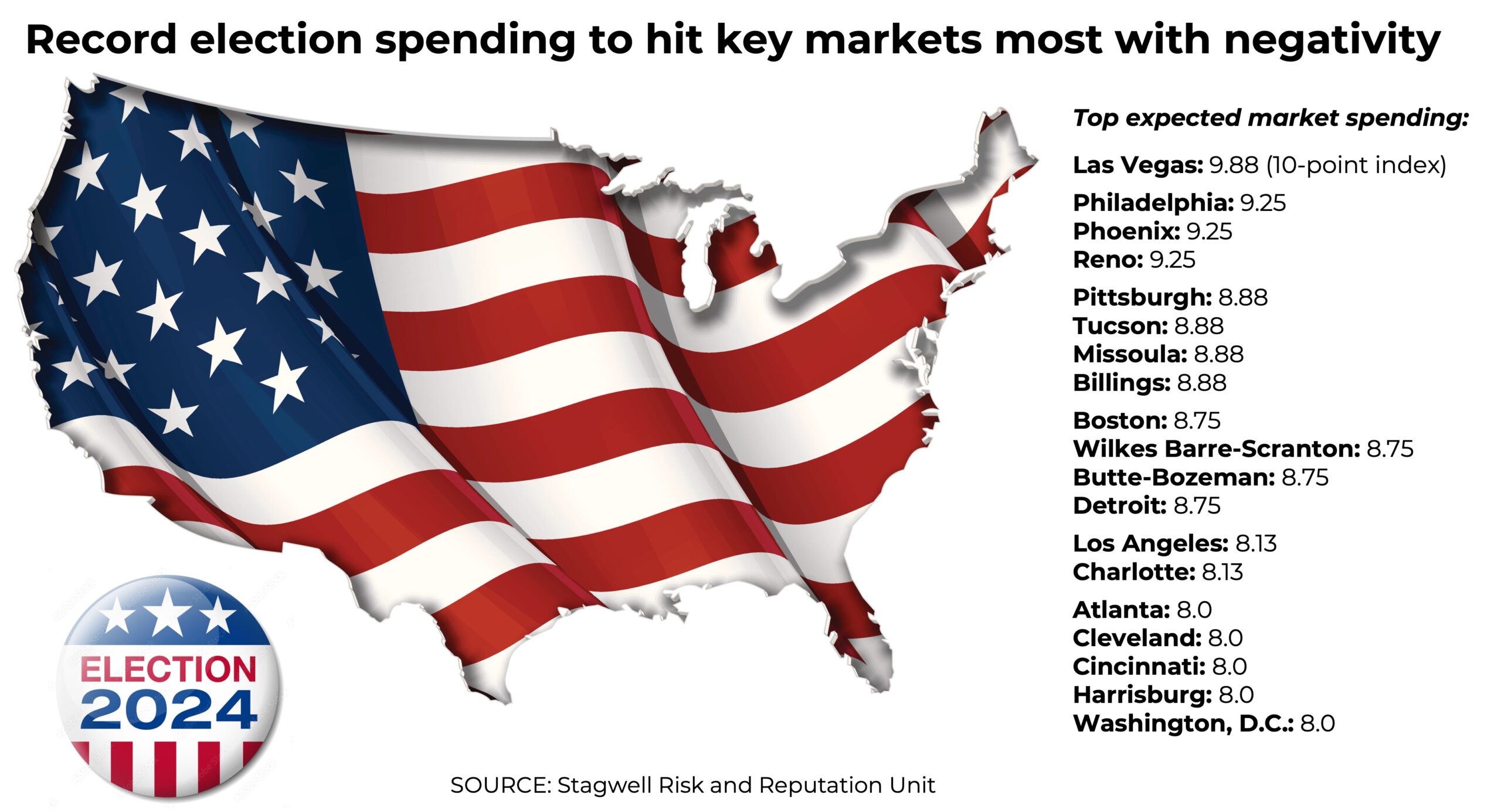Stagwell brought the Future of News to Cannes Lions, where our recent study showing that it’s safe for brands to advertise in the news was “the talk of the town,” according to Andrew Ross Sorkin in The New York Times’ DealBook and on CNBC’s “Squawk Box.” In the June edition of Hitting the Mark, I’m bringing you the Cannes highlights of all things Future of News, including insights from my interview with Business Insider; a Future of News panel featuring the CEOs of The New York Times, CNN, and Business Insider; and a Business of News panel featuring the CROs of top publishers.
As a recap, Stagwell’s landmark 50,000-person News Advertising Study, released in May, found that 1 in 4 Americans are news junkies — an audience whom advertisers are not capitalizing on. We showed that brand safety concerns — the idea that brands will suffer if their ads appear next to the “wrong” story — were unfounded: Americans don’t judge brands based on what news stories their ads appear next to.
I brought our findings to CMOs of the world’s biggest brands and news executives at Cannes this month. Four overarching themes emerged across our discussions:
- News junkies are an under-tapped, highly desirable, and wide-ranging audience. As I told Business Insider, if you’re not advertising in news, you’re probably not targeting your optimal consumers, so you’re probably not maximizing the benefit you can get out of your budget. News junkies are curious and persuadable individuals who come to the news with wide interests, ranging from cooking and games to fashion and sports.
- The vicious cycle of brands abandoning news is harming democracy. At the end of the day, news runs on business models. But because of brand safety apprehension, brands don’t advertise on news, news revenue declines, news quality worsens, and democracy suffers. Instead, advertisers need to start a “virtuous cycle” of investing in the news, as I wrote about in The Current. In the Sport Beach Content Studio, Dow Jones CRO Josh Stinchcomb talked about concrete ways to feed this virtuous cycle, such as convincing brands to move away from extensive, outdated blocklists.
- The news business has to be global. On the Sport Beach mainstage panel about Future of News, the CEOs of top publishers discussed the strength of having a global audience and why they are investing in their international coverage as a competitive advantage. In the same vein, we are planning to bring our Future of News research and studies around the world, with London up next.
- Integrating AI into journalism can help both news and brands target audiences even more effectively. Just like everyone else, newsrooms are tackling AI, and publisher CEOs spoke at Sport Beach about the ways they are implementing it: from an AI-enabled paywall at Business Insider to an AI-powered ad product designed to target consumers beyond first-party data at The New York Times. Stagwell agencies are already at the forefront of helping newsrooms with this AI reinvention. Code and Theory, which was just named ANA’s B2B Agency of the Year, is building expertise in this area with major projects such as designing and engineering NBC’s “Big Board” — a reliable, data-driven storytelling device depicting the nation’s political landscape in real time.

Coming out of Cannes, the future of news is clear: advertisers have a unique opportunity to target a curious, cream-of-the-crop audience, and AI will only augment reach.
The responsibility to invest in democracy is urgent: free, independent journalism is under ongoing attack. Just this week, The Wall Street Journal reporter Evan Gershkovich appeared in court for the start of an illegitimate and secret trial after 15 months of wrongful detention in Moscow. Share this letter from the Journal’s editor in chief to help elevate Evan’s story until he can tell his own.
We would love to have you on board our follow-up studies and summits as Future of News expands across the globe. Reach out to partner with the Stagwell team, and as always, please don’t hesitate to connect with any thoughts or questions.
Until next time,
Mark Penn
Related
Articles
In the News, Press Releases
Jul 09, 2025
STAGWELL LAUNCHES STAGWELL MEDIA PLATFORM (SMP), A CENTRALIZED TEAM OF GLOBAL MEDIA, TECHNOLOGY AND DATA INVESTMENT EXPERTS

In the News, Investments & Financials, Press Releases
Jul 08, 2025
Stagwell (STGW) Schedules Webcast to Discuss Financial Results for the Three Months Ended June 30, 2025

In the News, Investments & Financials, Press Releases, Talent & Awards
Jul 08, 2025
Stagwell (STGW) Advances Executive Team with Four Key Appointments

Newsletter
Sign Up
By: Ray Day
CONTACT:
We wanted to share our latest consumer and business insights, based on research from Stagwell. Among the highlights of our weekly consumer sentiment tracking:
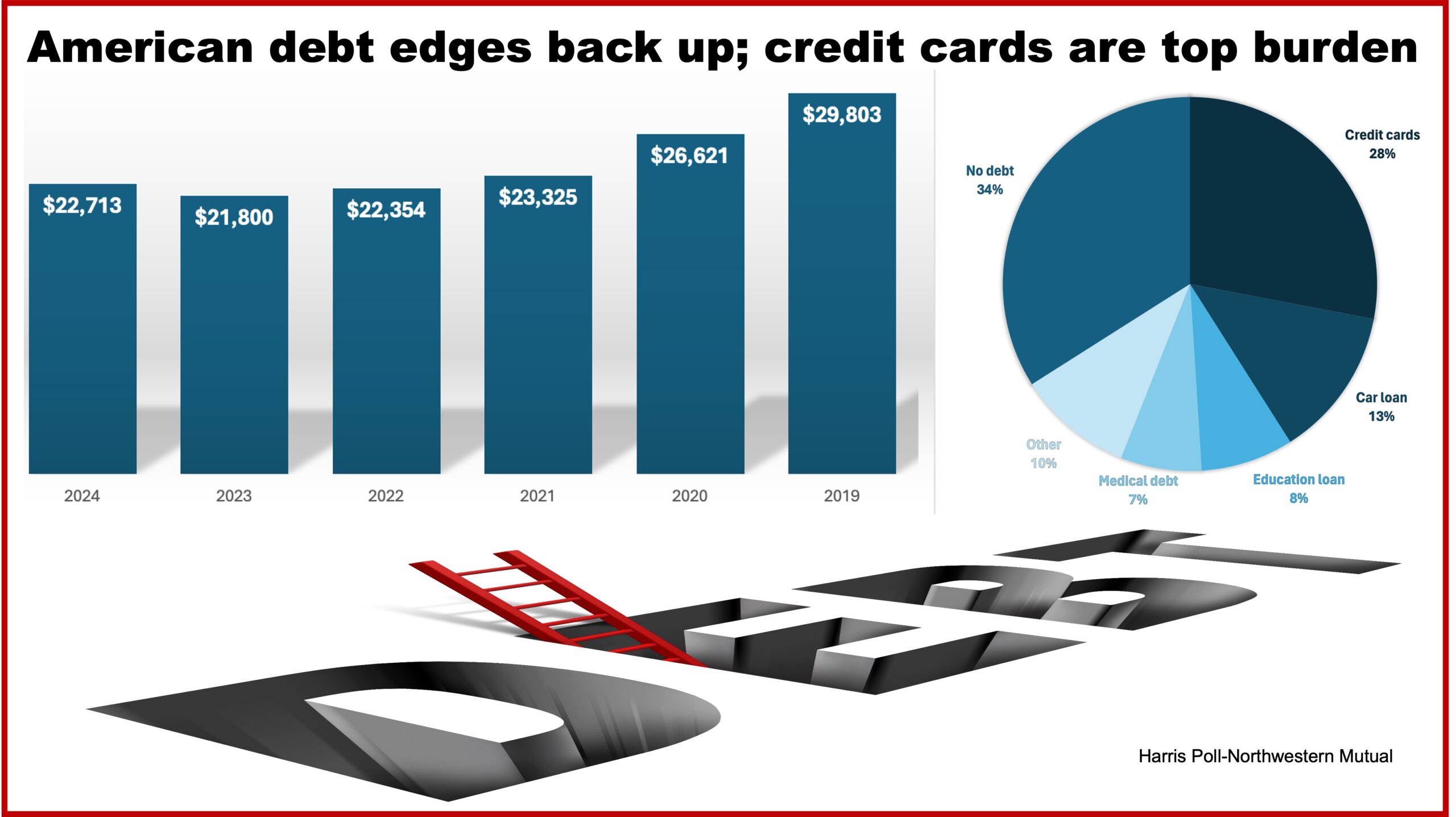
BUSINESS LEADERS MUCH MORE OPTIMISTIC THAN CONSUMERS
The economic outlook is quite different depending on whether you speak with business leaders or individuals, according to our fifth annual 2024 Milken Institute-Harris Poll Listening Project.
- 81% of business leaders believe the U.S. economy is strong, 84% are optimistic about their industry’s future, and 81% are optimistic about their company.
- In contrast, only 40% of Americans believe that the economy is strong, and 72% say “economists say things are getting better, but we’re not feeling it where I live.”
- AI is the second most disruptive issue for a company today – with 87% of business leaders calling it very or somewhat disruptive, along with financial uncertainty (88%), cybersecurity (84%), changing generational values (82%) and inconsistent government policies (82%).
- 73% of Americans believe the country is losing its global leadership position, and 69% say “America is no longer competitive in the global economy.”
- 71% of Americans believe “innovation is bubbling up in local communities, but national media is missing this story.”
MOST UNPREPARED FOR BUSY HURRICANE SEASON
The 2024 Atlantic hurricane season is expected to be the strongest in recent years, yet more than half of Americans (52%) would only have enough food in their home for one or two days if there were a widespread power outage, according to our Harris Poll research with Generac.
- 71% of Americans would be concerned with food spoilage if their home experienced an extended power outage.
- 50% would struggle financially to replace perishable food lost due to an extended power outage.
- 36% have medical devices powered by electricity that they or someone in their home use daily.
- 77% of pet owners are willing to risk their own comfort to stay with their pets at home during extended power outages.
20 YEARS TO PAY OFF STUDENT LOANS
Most Americans believe it will take more than two decades to pay off their student loans, according to our Harris Poll research with Northwestern Mutual.
- Americans saving for college think it will cost more than $77,000 – a debt they don’t expect to pay off until age 45.
- 2 in 10 Americans who are saving for higher education for a loved one are simultaneously paying off their own college loans.
- Americans’ personal non-mortgage debt edged higher this year to nearly $23,000 – after several years of paying down debts. The leading source is credit cards.
- Millennials and Gen X have the most debt, and many say they’re carrying their highest level of debt ever.
- 40% of Americans do not have an emergency fund.
FUTURE OF NEWS
Stagwell is hosting the “Future of News Summit” next Wednesday, May 15 in New York. The summit is the culmination of groundbreaking Stagwell research on journalism and advertising. While news is the foundation of a thriving democracy, advertising tied to certain kinds of news is increasingly being attacked under the banner of “brand safety.” This has been used to scare businesses into pulling back from news advertising, which, in turn, is weakening the journalism model.
- Along with an overview of the research findings, the summit will include award-winning journalists and top brand leaders who will discuss the continued power in news driving strong business results.
- Among the leaders joining are: Hannah Beckler, Business Insider; Jason Conti, Dow Jones; Jason Rezaian, The Washington Post; Megan Twohey, The New York Times; Tara Carraro, U. S. Steel; Will Doherty, The Trade Desk; Dan Gardner, Code and Theory; Shenan Reed, General Motors; Lou Paskalis, Ad Fontes Media; Mark Penn, chairman and CEO, Stagwell; and Ray Day, vice chair, Stagwell.
- Want to know more about Stagwell’s commitment to news? Sign up to receive the findings at this link or reach out to Alexis.Williams@StagwellGlobal.com.
ICYMI
In case you missed it, check out some of the thought-leadership and happenings around Stagwell making news:
- PRSA’s Strategy to Out-Communicate Misinformation
- Crypto is ‘top of mind for voters’ in US swing states — Harris Poll
- Americans Are Racking Up ‘Phantom Debt’ That Wall Street Can’t Track
- Travel and makeup are popular among boomers, fueling TripAdvisor and Sephora
- New Yorkers are Worried about the Waste Crisis but Don’t See a Plastic Ban as a Solution
Related
Articles
In the News, Investments & Financials, Press Releases, Talent & Awards
Jul 08, 2025
Stagwell (STGW) Advances Executive Team with Four Key Appointments

In the News, Press Releases, Thought Leadership
Jun 10, 2025
Stagwell (STGW) Chairman and CEO Mark Penn to Discuss the Irreplaceable Power of Human Creativity on the Main Stage of Cannes Lions

Events, In the News, Press Releases, Talent & Awards
Jun 05, 2025
Code and Theory Named ANA B2B Agency of the Year After Transforming the World’s Leading Brands

Newsletter
Sign Up
By: Ray Day
CONTACT:
We wanted to share our latest consumer and business insights, based on research from Stagwell. Among the highlights of our weekly consumer sentiment tracking:
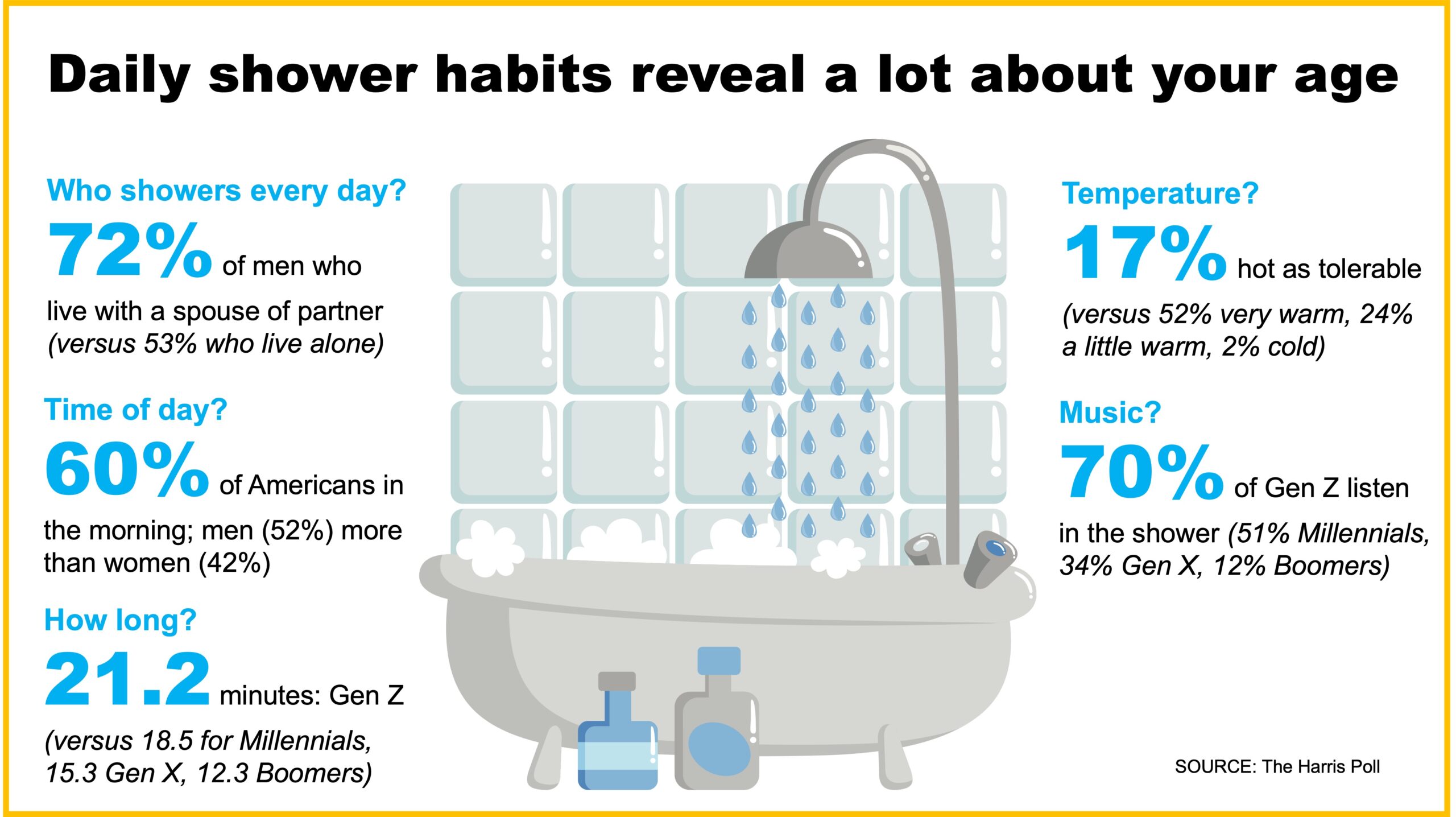
BORDER ISSUES VIEWED AS CRISIS
American sentiment on immigration is boiling over, according to latest Axios Vibes by The Harris Poll.
- 64% of Americans say the current U.S. southern border situation is a crisis, not a politically driven media narrative.
- 51% – including 42% of Democrats – would support mass deportations of undocumented immigrants.
- The survey also found discrepancies between Americans’ perceptions of immigration and facts: 64% wrongly believe immigrants receive more in welfare and benefits than they pay in taxes, and 56% wrongly assume that illegal immigration is linked to spiking U.S. crime rates.
- Americans strongly support immigration as long as it is lawful, with 65% thinking the U.S. should make it easier for anyone seeking a better life to enter legally.
- 58% support expanding legal pathways for orderly immigration.
MOOD OF COUNTRY REMAINS FLAT
Americans’ views of how things are going remains little changed from last month, according to our most recent poll with the Center for American Political Studies at Harvard University.
- 34% of Americans say the country is on the right track (equal with 34% a month ago), and 35% say the economy is on the right track (up slightly from 34% last month).
- 48% say their personal financial situation is becoming worse (compared with 47% a month ago), while 29% say it is improving (compared with 27% a month ago).
- Top issues for Americans remain immigration (35%) and price increases/inflation (35%), followed by the economy (with a 3-point improvement in perception from a month ago).
- Right now, Americans are more focused on domestic issues than foreign policy: 59% say this is a time in world affairs that enables the U.S. to focus primarily on domestic issues, rather than spend more on military and foreign affairs (Democrats: 58%, Republicans: 57% and Independents: 63%).
- 58% say the U.S. does not have the leadership necessary to handle world affairs.
- 56% support sending $26 billion in aid to Israel; 49% support sending $8 billion in aid to the Indo-Pacific, including Taiwan; and 48% support sending $61 billion in aid to Ukraine.
RELIGION AS PART OF DEI RECEIVES MIXED REVIEWS
As employees’ needs and employers’ budgets have evolved, so have DEI teams. Based on our latest Harris Poll research with HR Brew, sharing religious beliefs at work is causing conflict among some coworkers.
- 67% of Americans think companies should have a formal DEI program.
- Yet only 49% of employees report that their company has a formal initiative, and 22% are not sure.
- 43% report having religious/faith DEI programming, yet employees are split over whether or not religion should be part of DEI: 54% said it would be appropriate to integrate it into DEI, while 41% said it shouldn’t – more than those who said the same about disability (26%), race (31%) and gender (33%).
- Workplace tensions might be driving the split: 41% say that conflicts related to faith/religion have caused tension at their workplace.
- Also, while 78% of Americans want companies to reflect the diversity of the U.S. population, 49% find the acronym “DEI” to be divisive, based on our previous research.
HOW YOU SHOWER SHOWS YOUR AGE
You might think your shower habits are random, yet new data from The Harris Poll reveals that showering is indicative of your age.
- The older you are, the shorter your shower time: Gen Z spends the longest time in the shower, at an average of 21.2 minutes, nearly twice as long as the 12.3 minutes for Boomers.
- 17% of Boomers shower five minutes or less.
- Gen X is mostly likely to take a daily shower (at 69%).
- Men are more likely to shower in the morning, while women are more likely to shower in the evening.
- The time of day that a person showers also varies by age group: 51% of Gen X say they typically are showered by 9 a.m., while 50% of Gen Z report showering after 8 p.m.
GEN Z LIKES USED HERMES AND CARTIER PRODUCTS
Surging demand for secondhand luxury goods is helping to boost the image of upscale brands Hermès and Cartier among Gen Z, according to our Harris Poll research with Ad Age.
- Hermès tops our latest Gen Z brand tracker, while Cartier comes in ninth. The tracker ranks brands that made significant progress in gaining attention from Gen Z in the first quarter of 2024.
- Other brands cracking the top five are Peppa Pig, Firehouse Subs, Coinbase and StubHub.
ICYMI
In case you missed it, check out some of the thought-leadership and happenings around Stagwell making news:
- Businesses Are Way More Optimistic Than Consumers, Poll Finds
- Stagwell Announces ‘Future of News’ Summit on May 15 Featuring Trailblazing Panelist Discussions and 50,000-Respondent Study Revealing the Importance of Investing in News
- Human Progress Report: Continuous learning is critical to achieving security and well-being.
- Navigating a new era of streaming
- Why Trees And Green Spaces Are Good For Our Health And Wellbeing
Related
Articles
In the News, Investments & Financials, Press Releases, Talent & Awards
Jul 08, 2025
Stagwell (STGW) Advances Executive Team with Four Key Appointments

In the News, Press Releases, Thought Leadership
Jun 10, 2025
Stagwell (STGW) Chairman and CEO Mark Penn to Discuss the Irreplaceable Power of Human Creativity on the Main Stage of Cannes Lions

Events, In the News, Press Releases, Talent & Awards
Jun 05, 2025
Code and Theory Named ANA B2B Agency of the Year After Transforming the World’s Leading Brands

Newsletter
Sign Up
By: Ray Day
CONTACT:
We wanted to share our latest consumer and business insights, based on research from Stagwell. Among the highlights of our weekly consumer sentiment tracking:
AMERICANS ADD PARENTS’ FINANCES TO RETIREMENT WORRIES
Americans already are worried about their own retirement, and, now, they are adding their parents’ financial futures to the list, based on our Harris Poll survey with NerdWallet.
- 36% think their parents will need financial assistance as they age.
- 22% of Millennials currently assist their parents financially.
- 37% say their parents do not have the financial means to prepare for the future.
- 10% say their parents expect them to help pay for things, and the same number expect to need their children’s help financially in retirement.
YOUNG PEOPLE DON’T SEE THE STARS IN THEIR FUTURE
Interest in astrology skyrocketed in the late 2010’s. Today, however, birth chart memorizing and horoscope use are waning among younger Americans, according to our Harris Poll survey with Cosmopolitan.
- 83% of Millennials are “somewhat” or a “total” believer in astrology, compared with 62% of Gen Z and 69% of Americans overall.
- 95% know their zodiac sign, and 65% believe it is an accurate representation of themselves (75% for Millennials and 61% for Gen Z).
- Astrology skepticism is highest among Gen Z: 54% say “I judge people who take astrology too seriously” (versus 46% of Millennials who say the same).
- 81% of Millennials say they have consulted or would consult the stars for guidance on relationships (versus 59% for Gen Z).
RECORD ELECTION AD-SPEND NEGATIVITY ABOUT TO BEGIN
If you are in Las Vegas, Philadelphia, Phoenix or Reno, prepare for a nearly 24/7 negative advertising blitz as the U.S. General Election is just six months away, according to the latest insights from Stagwell’s Risk and Reputation Unit.
- Las Vegas, Philadelphia, Phoenix and Reno will be bombarded the most by a record $12 billion to be spent across media channels this election cycle.
- Other markets with expected high political advertising and political talk in general include Pittsburgh, Tucson, Missoula, Billings, Boston, Wilkes Barre-Scranton, Butte-Bozeman, Detroit, Los Angeles, Charlotte, Atlanta, Cleveland, Cincinnati, Harrisburg, D.C. and Raleigh-Durham.
- Negative communications about the economy could not only affect people’s votes; it could depress their willingness to spend.
- To prepare businesses for the next six months, Stagwell is conducting company briefings with data, insights and recommendations. If your organization would benefit from smart info about the upcoming election, email Alexis Williams to schedule time.
2 IN 3 STILL HIDE MARIJUANA USE
Most Americans don’t know marijuana isn’t entirely legal across the United States, according to our Harris Poll with Politico.
- 59% are surprised marijuana hasn’t been legalized across the U.S.
- 64% say it no longer carries the stigma it used to have.
- 68% believe it soon will be as common as drinking alcohol.
- 77% of marijuana users prefer it to cigarettes, and 73% prefer it to alcohol.
- 40% report being marijuana users (15% daily and 25% weekly).
- 62% have traveled to places where recreational marijuana is legal.
- Despite wider acceptance, 64% of users say they are selective about sharing their marijuana usage.
- 56% wouldn’t disclose usage on the first few dates.
ICYMI
In case you missed it, check out some of the thought-leadership and happenings around Stagwell making news:
Related
Articles
In the News, Investments & Financials, Press Releases, Talent & Awards
Jul 08, 2025
Stagwell (STGW) Advances Executive Team with Four Key Appointments

In the News, Press Releases, Thought Leadership
Jun 10, 2025
Stagwell (STGW) Chairman and CEO Mark Penn to Discuss the Irreplaceable Power of Human Creativity on the Main Stage of Cannes Lions

Events, In the News, Press Releases, Talent & Awards
Jun 05, 2025
Code and Theory Named ANA B2B Agency of the Year After Transforming the World’s Leading Brands

Newsletter
Sign Up
By
Stagwell’s Risk and Reputation Unit
Welcome to the RiskRep Radar, a newsletter from Stagwell’s Risk and Reputation Unit on what companies and business leaders need to know about the intersection of business and politics.

How business is a key election issue
For the first time in decades, immigration is the number one concern for voters, according to the latest Harvard CAPS-Harris poll. Yet, when asked what issue matters most to voters personally, every demographic group picks inflation and cost increases.
This focus will bring business into the crossfire. With Donald Trump’s tax cuts set to expire next year, CEO pay and corporate taxes will become key talking points for both campaigns. With abortion rights rising to the fore again following Arizona’s recent Supreme Court decision, corporate health care policies could come under increased scrutiny, especially by political candidates looking to drum up outrage.
Equally, businesses with strong ties to China could come under fire.
Based on Stagwell’s experts working inside all the campaigns, Democrats and Republicans will be running hard on the following issues:
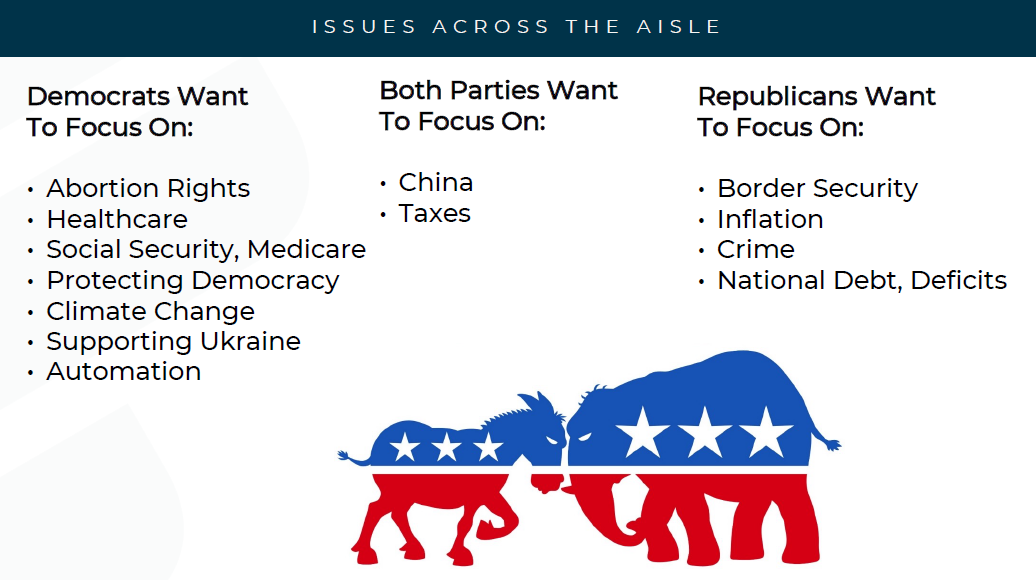
A battle of generations, not just parties
Age, not just than partisanship, also is behind several of the issues dividing Americans today. Gen Z is by far the most comfortable with employee activism, and tensions over Israel-Hamas continue to spill into the workplace. Google just fired 28 workers for participating in protests over its Israel contract. Universities have faced most of the criticism from politicians so far, but companies should be ready to be next.
The same pattern is emerging around TikTok. While roughly two thirds of Democrats, Republicans and Independents support a TikTok ban, there’s a wide difference by age. Gen Z (18-24-year-olds) is the only age group to oppose a TikTok ban (57%). At the other end, 84% of those 65 and older support the ban.
Key markets will be swamped with ads creating a negative communications environment
Stagwell’s omnichannel agency Assembly projects a record $12 billion will be spent across media channels this election cycle year. This spending will be highly targeted and concentrated in key markets.
Las Vegas, Philadelphia, Phoenix and Reno will be bombarded the most, followed by Pittsburgh, Tucson, Missoula, Billings, Boston, Wilkes Barre-Scranton, Butte-Bozeman, Detroit, Los Angeles, Charlotte, Atlanta, Cleveland, Cincinnati, Harrisburg, D.C. and Raleigh-Durham.
Importantly, as the election ads heat up, these markets will be inundated with nearly complete negativity – which will make communicating and marketing more difficult than ever. Specifically, negative advertising about the economy could not just affect people’s votes; it could depress their willingness to spend.
It is more important than ever for business leaders to be prepared for this election cycle with bipartisan advisory teams, integrated vetting processes, scenario planning and 24/7 monitoring.
Explore our full presentation on the issues driving the 2024 campaigns here.
ICYMI: Risk and Reputation Unit in the News
Related
Articles
In the News, Press Releases
Jul 09, 2025
STAGWELL LAUNCHES STAGWELL MEDIA PLATFORM (SMP), A CENTRALIZED TEAM OF GLOBAL MEDIA, TECHNOLOGY AND DATA INVESTMENT EXPERTS

Artificial Intelligence, In the News, Marketing Frontiers, Press Releases, Stagwell Marketing Cloud, Tech
Jun 12, 2025
PRophet, a Stagwell (STGW) Company, Completes Integration of UNICEPTA, Launches Unified Brand and Enhanced Media Intelligence Offering

In the News, Marketing Frontiers, Press Releases, Stagwell Marketing Cloud, Tech
Jun 11, 2025
The Marketing Cloud Launches Cutting-Edge Platform to Simplify Marketing Workflows
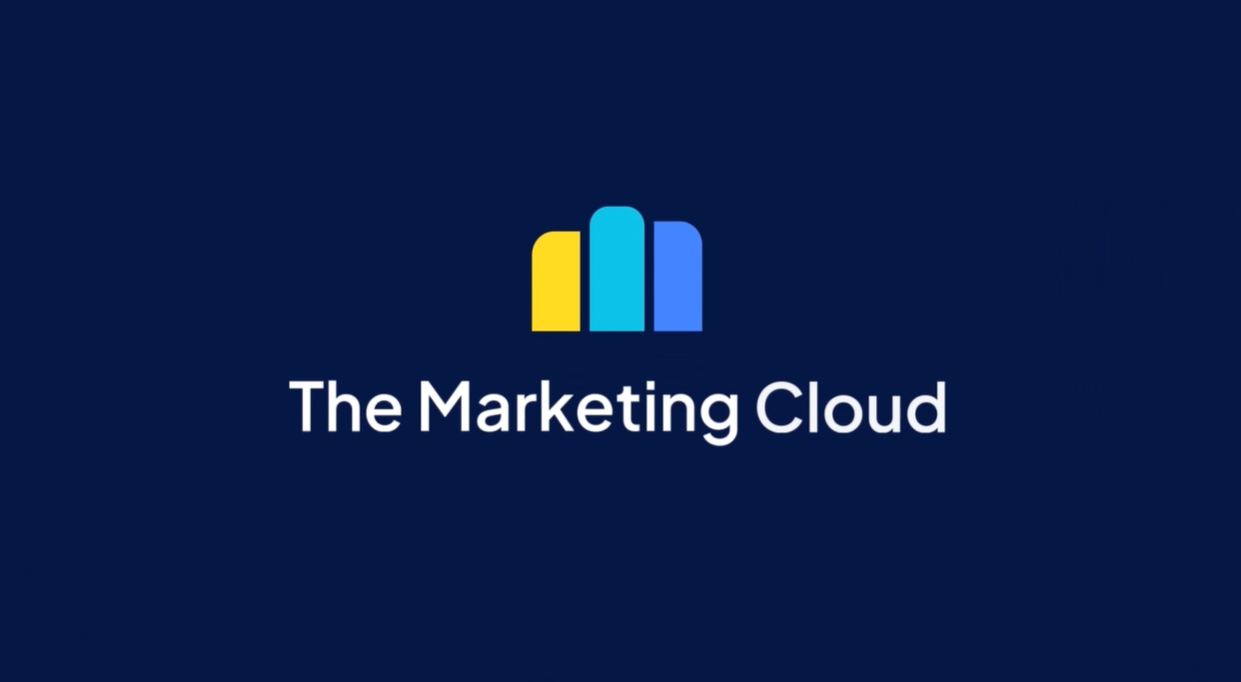
Newsletter
Sign Up
By: Ray Day
CONTACT:
We wanted to share our latest consumer and business insights, based on research from Stagwell. Among the highlights of our weekly consumer sentiment tracking:
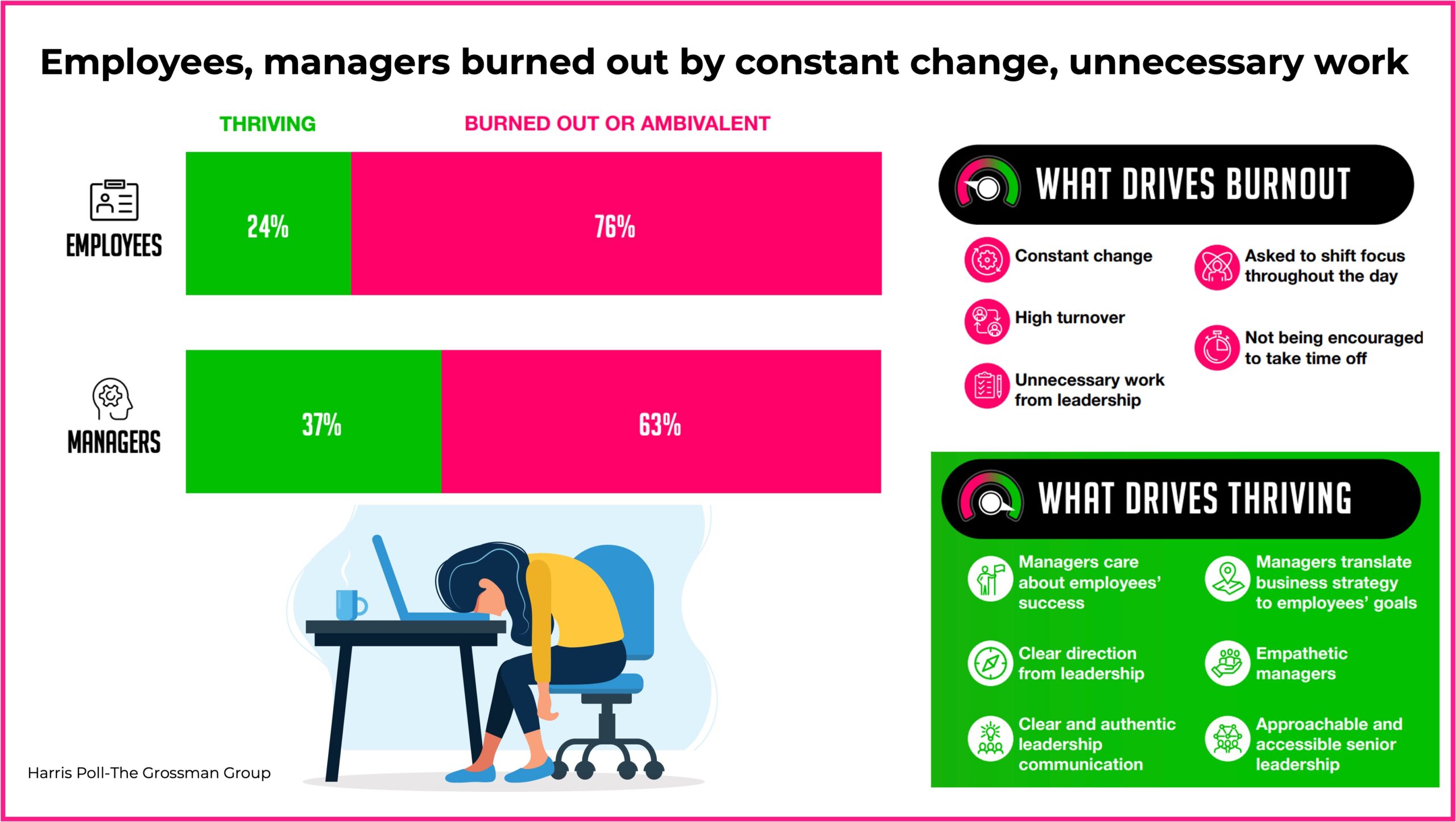
BURNED OUT AND CHECKED OUT
Employees and managers are burned out and checked out by the constant pace of change and new workplace demands, according to our Harris Poll research with The Grossman Group.
- 76% of employees and 63% of managers report feeling burned out or ambivalent in their current position.
- Yet managers aren’t recognizing just how overwhelmed employees feel: 89% of managers believe employees are thriving compared with the actual thriving figure of 24%.
- 58% of burned-out employees and managers strongly agree that they are mentally exhausted.
- 54% strongly agree that they feel overwhelmed in their current role.
- Top drivers of burnout with employees are constant change, unnecessary work and turnover.
- Top drivers for thriving employees include: manager invested in their success (61%); empathetic manager (57%); and approachable senior leadership (53%).
AMERICANS SAY PERSONAL FINANCES REMAIN TOUGH
While the news reports say the economy is improving, Americans are not feeling it in their own finances, according to our Harris Poll survey with the National Foundation For Credit Counseling.
- 32% say they are “just getting by financially.”
- 31% don’t pay all their bills on time – up from 27% last year.
- 61% feel most improvements in the U.S. economy do not benefit people like them.
- 39% of Americans are concerned that their money won’t last.
- 24% feel they will never have the things they want because of their financial situation.
- Also, fewer Americans today give themselves an A or B when considering their personal finance knowledge (53% today versus 57% a year ago).
UPSKILLING VERSUS A COLLEGE DEGREE
Upskilling could upend the college degree in the next 10 years, based on The Harris Poll’s new “Human Progress” global report with ETS.
- 88% feel the lifetime value of college is eroding as continuous learning becomes essential to success.
- 78% believe that evidence of ongoing skill acquisition will be as valuable as a university degree by 2035.
- Across the globe, however, cost is the number one barrier to upskilling and lifelong learning – especially for women, older generations, the unemployed and those in rural areas.
- 72% globally would trust AI-generated guidance for improving skills.
- Yet 71% also worry that AI has the potential to negatively affect learning assessments due to biases and programming flaws.
DECLINE OF THE SOCIAL MEDIA INFLUENCER
More than 8 in 10 Americans say fake product reviews and paid influencer posts make it challenging to find honest recommendations, according to new Harris Poll research with ExpertVoice.
- When shopping online, 44% of consumers feel overwhelmed by the abundance of choices, and 57% feel compelled to continually cross-compare options.
- 77% distrust social media influencers.
- 81% are skeptical that social media influencers have expertise in the products or services they are trying to sell.
- 83% prioritize recommendations from knowledgeable individuals over social media influencers.
- 55% seek transparency and desire more verified expert reviews.
- 49% want to see non-paid reviews.
- 2 in 3 consumers make purchases without consulting reviews.
- Those who do rely on reviews spend an average of 19 minutes reading at least 11 reviews before finalizing a decision.
ALL THE NEWS THAT FITS ON SOCIAL MEDIA
Young people are using social media more than ever for their news and information – and they do not consume news through traditional channels, according to our Harris Poll survey with Axios.
- Three fourths of Gen Z, Millennials and Gen X use social media to find news, compared with 44% of Boomers.
- The most popular platforms for news gathering among Gen Z include Instagram (71%), YouTube (69%), TikTok (65%) and Facebook (51%).
- 44% of Gen Z report consuming news on X and 22% on LinkedIn.
- At the same time, 65% of Gen Z members are reducing their news consumption to protect their mental health and wellness.
ICYMI
In case you missed it, check out some of the thought-leadership and happenings around Stagwell making news:
- How Stagwell’s politics-focused agencies are advising brands in 2024
- Building trust, credibility, and relationships through brand content
- Employees Embrace AI in the Workplace, Want More Training, Guidance From Employers
- Two-Thirds of U.S. Adults Would Rather Wait to Watch Movies on Streaming
- Companies that fail to take advantage of expanding work spans are leaving value and money on the table
Related
Articles
In the News, Investments & Financials, Press Releases, Talent & Awards
Jul 08, 2025
Stagwell (STGW) Advances Executive Team with Four Key Appointments

In the News, Press Releases, Thought Leadership
Jun 10, 2025
Stagwell (STGW) Chairman and CEO Mark Penn to Discuss the Irreplaceable Power of Human Creativity on the Main Stage of Cannes Lions

Events, In the News, Press Releases, Talent & Awards
Jun 05, 2025
Code and Theory Named ANA B2B Agency of the Year After Transforming the World’s Leading Brands

Newsletter
Sign Up
By: Ray Day
CONTACT:
We wanted to share our latest consumer and business insights, based on research from Stagwell. Among the highlights of our weekly consumer sentiment tracking:
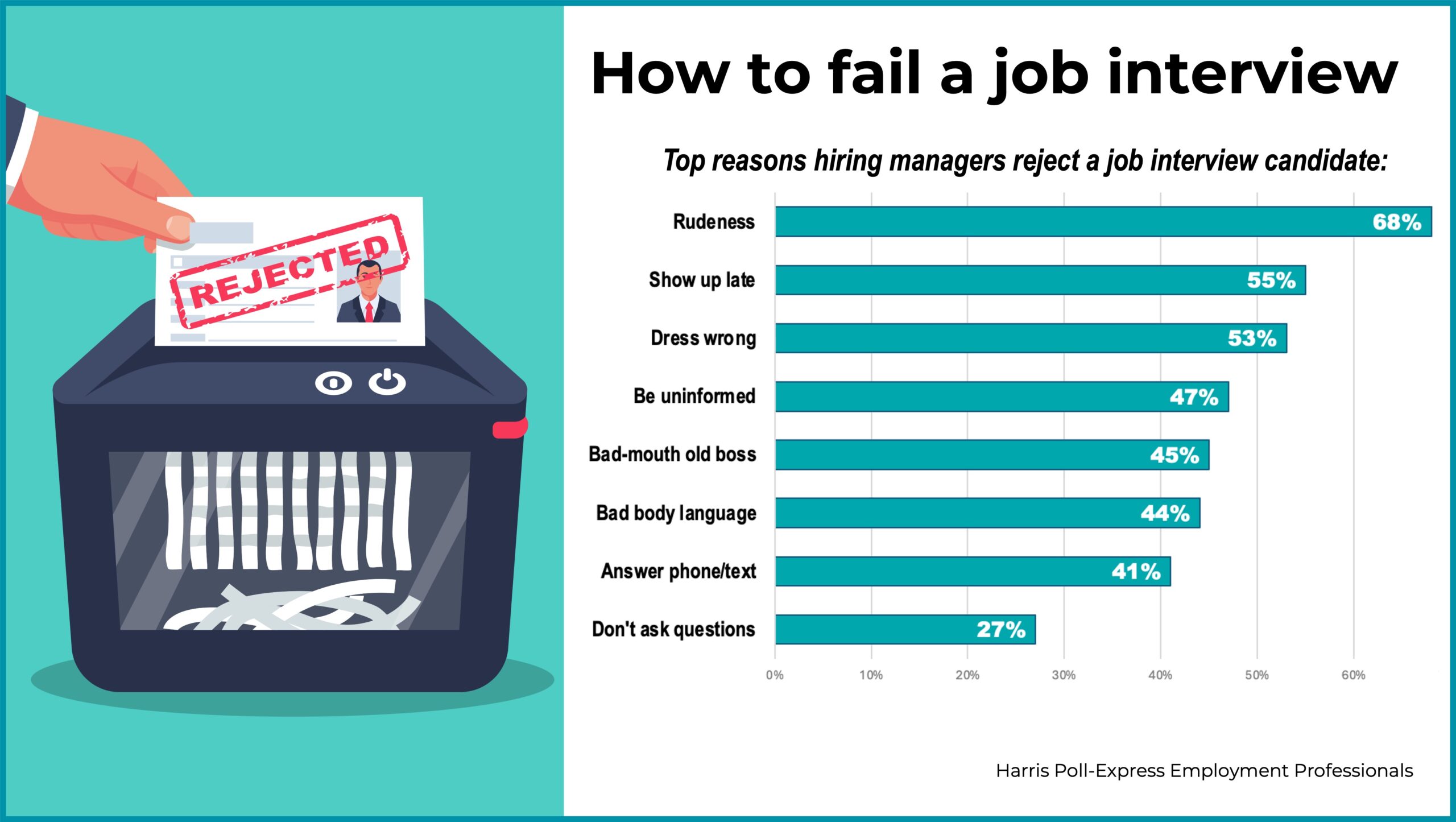
HOW TO FAIL A JOB INTERVIEW
When interviewing, hiring managers recommend showing up on time and being nice if you want to land the job, according to our Harris Poll survey with Express Employment Professionals.
- 68% of hiring managers say being rude is the reason an applicant is disqualified from contention.
- 55% indicate showing up late is a dealbreaker.
- 53% say dressing inappropriately ends consideration.
- Hiring managers’ other pet peeves: being uninformed about the organization and/or the position (47%); using unprofessional body language (44%); and not asking questions (27%).
- Other don’ts: talking negatively about a previous position or manager (45% of hiring managers say this will disqualify you) and answering phone calls or exchanging text messages during an interview (41%).
- A third of candidates admit they’ve made these fatal mistakes: checked their watches (33%), swore (32%) or were caught in a lie (28%).
GET READY FOR THE POLITICAL AD ONSLAUGHT
2024 will be the most expensive U.S. election cycle ever – with an estimated $12 billion spent across media channels, according to Stagwell’s Assembly agency.
- 65% of political spending this season is expected on traditional TV, followed by streaming TV (13%), social media (12%) and radio (10%).
- While spending overall will be a record, ads will be centered on a few key markets: Las Vegas, Philadelphia, Phoenix, Reno and Pittsburgh are the top five using Assembly’s Market Intensity Index, which evaluates expected political spending.
- The discussion on AI-created political ads is making headlines, yet the continued shift to streaming and digital is the big political advertising story of 2024.
- DIGGING DEEPER: Stagwell’s Risk and Reputation Unit leaders will discuss the latest issues from the campaign trail and the political advertising environment during a free 30-minute webinar at noon ET Thursday, April 18. Email Alexis Williams for an invitation.
AMERICANS ARE EXHAUSTED BY NEGATIVITY
Americans are finding it harder to have fun, are hanging out less and are fatigued by divisive polling data and a news cycle that spurs division, according to the new National Temperature Check conducted by The Harris Poll for Johnsonville.
- 80% of adult Americans say they are exhausted by the anger and negativity in America today.
- 89% would like to see less negativity in the news and social media.
- 60% say having fun with people has become harder.
- 67% are hanging out with people less than they did five years ago.
ICYMI
In case you missed it, check out some of the thought-leadership and happenings around Stagwell making news:
- Tackling Misinformation: A Conversation With PRSA Chair-Elect Ray Day, APR
- Podcast: Mark Penn discusses how businesses navigate the polarizing political environment
- Consumers struggle to distinguish videos recorded by humans from those generated by OpenAI’s Sora
- Overwhelmed Job Recruiters Getting Sloppy, per Survey
- Companies Recognize the Power of Comprehensive Benefits in Attracting and Retaining Top Talent
- 3 virtual reality trends brands should know
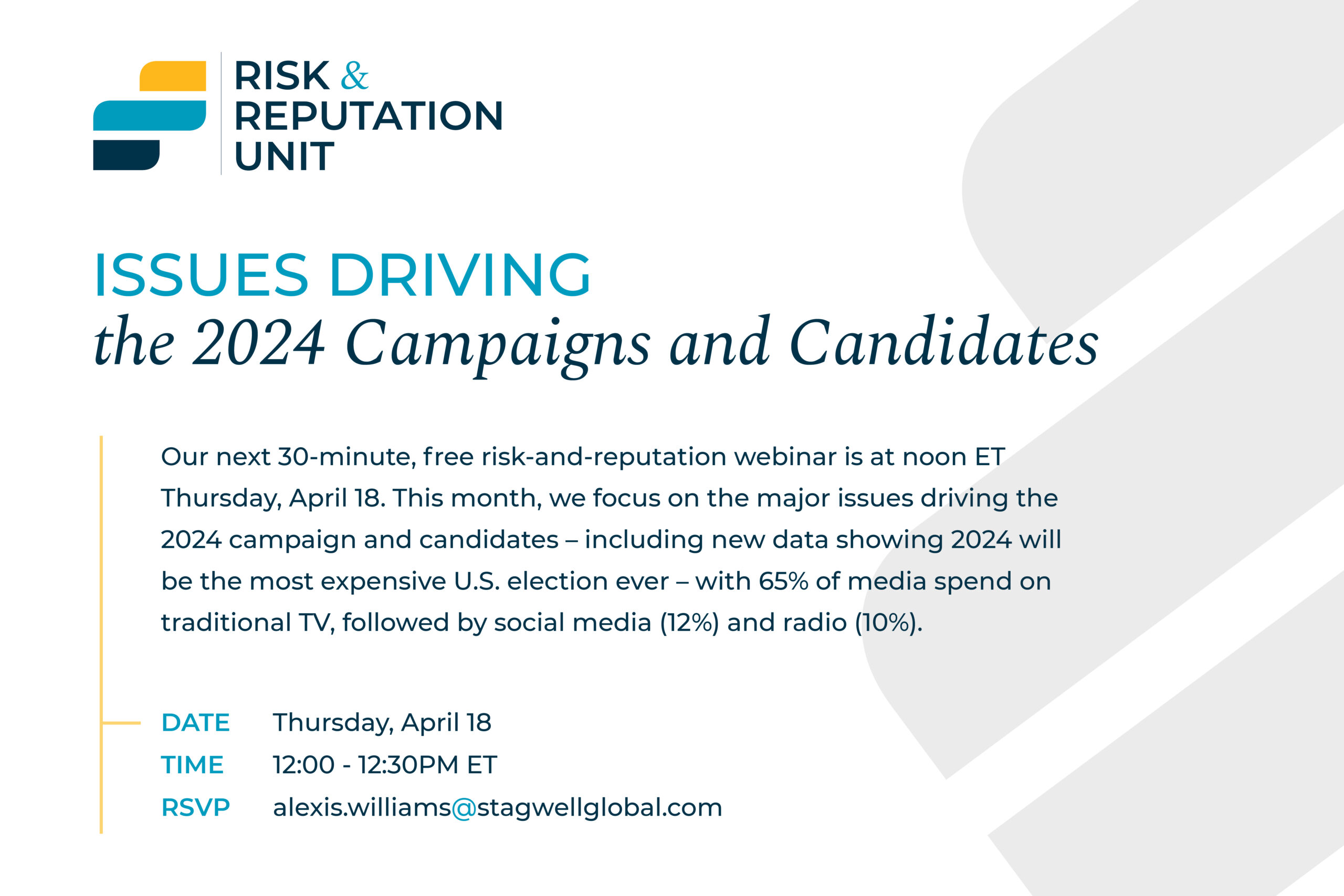
Related
Articles
In the News, Investments & Financials, Press Releases, Talent & Awards
Jul 08, 2025
Stagwell (STGW) Advances Executive Team with Four Key Appointments

In the News, Press Releases, Thought Leadership
Jun 10, 2025
Stagwell (STGW) Chairman and CEO Mark Penn to Discuss the Irreplaceable Power of Human Creativity on the Main Stage of Cannes Lions

Events, In the News, Press Releases, Talent & Awards
Jun 05, 2025
Code and Theory Named ANA B2B Agency of the Year After Transforming the World’s Leading Brands

Newsletter
Sign Up
By: Ray Day
CONTACT:
We wanted to share our latest consumer and business insights, based on research from Stagwell. Among the highlights of our weekly consumer sentiment tracking:
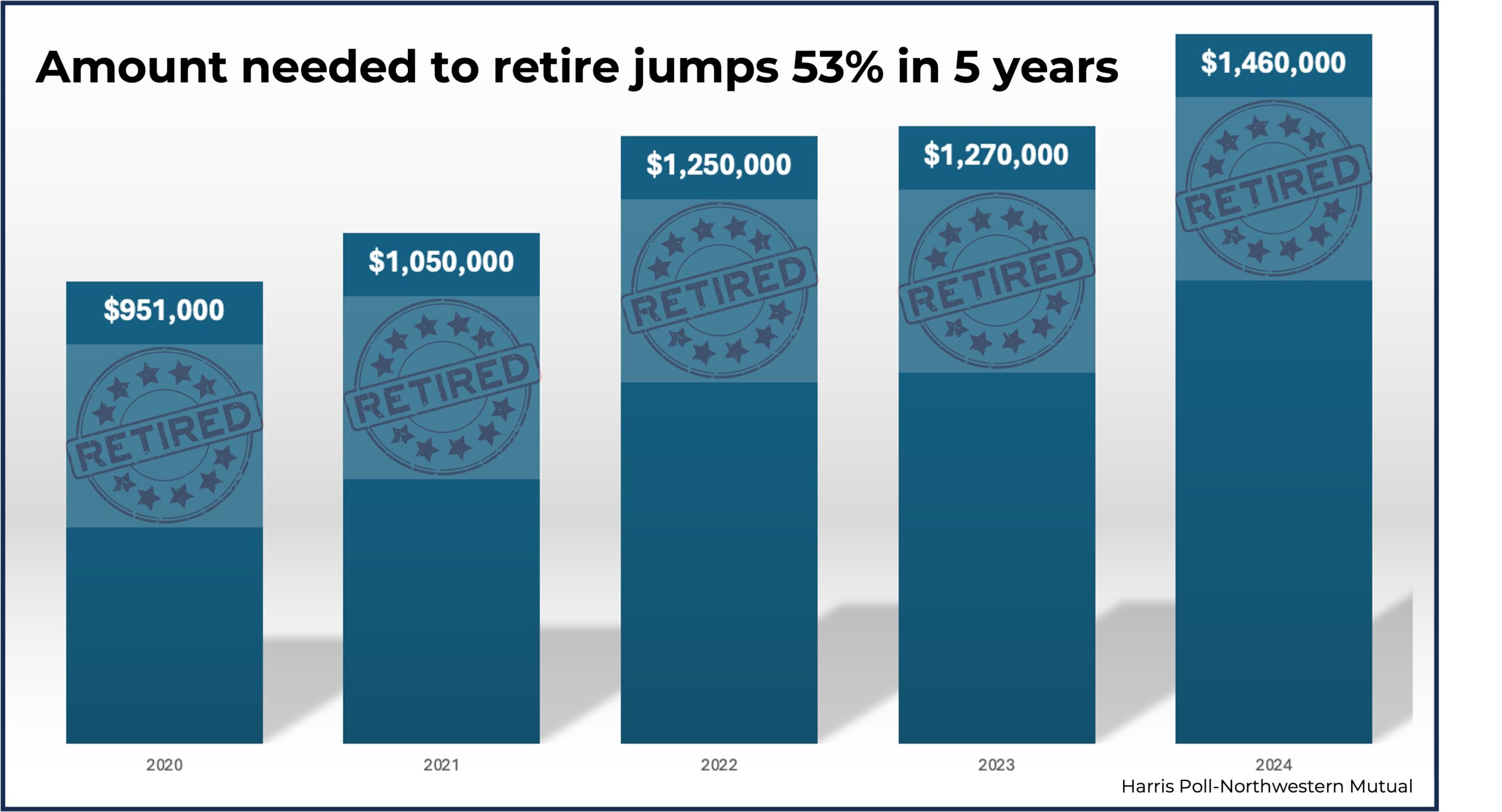
MAGIC NUMBER NEEDED TO RETIRE SKYROCKETS
Americans’ “magic number” needed to retire is at an all-time high – rising faster than inflation and up more than 50% since the pandemic, according to Northwestern Mutual’s 2024 Planning & Progress Study with The Harris Poll.
- U.S. adults believe they need $1.46 million to retire comfortably, a 15% increase from the $1.27 million reported last year.
- The magic number has jumped 53% from $951,000 Americans targeted in 2020.
- At the same time, the average amount U.S. adults have saved for retirement dropped from $89,300 last year to $88,400 today – and far below the $98,800 in savings in 2021.
- 31 is the average age Americans start saving for retirement.
- Most people expect to work to 65. That varies by generation, however: Gen Z expects to retire at age 60, Boomers at 72, Millennials at 64 and Gen X at 67.
- 32% of Millennials and 30% of Gen Z expect to live to 100 – higher than the 22% of Gen X and 21% of Boomers who expect to become a centenarian.
- Among those closest to retirement, only half believe they will be financially prepared for retirement when the time comes (48% of Boomers and 48% of Gen X).
- 43% of Americans believe they could outlive their savings – highest among Gen Z (46%) and Millennials (46%).
PROPOSED TIKTOK BAN DOESN’T CHANGE GEN Z’S MIND
Despite a bill that could ban TikTok in the U.S., support remains strong among Gen Z, the app’s core constituency, according to our Harris Poll survey with Ad Age.
- 64% of Gen Z are on TikTok daily, compared with 33% of Millennials, 24% of Gen X and 5% of Boomers.
- 75% of Gen Z believe losing access to TikTok would negatively affect brands (compared with 51% of the general population).
- 76% of Gen Z believe TikTok advertisements are a good way for brands to reach consumers – and 40% have shopped on TikTok.
- While 59% of all users believe TikTok promotes content that spreads misinformation, 59% of Gen Z trusts TikTok more than other social media (compared with 29% of the general population).
- 66% of Gen Z use YouTube daily (compared with 45% of the general population). That is slightly higher than the 64% of Gen Z who use TikTok daily (versus 26% of the general population).
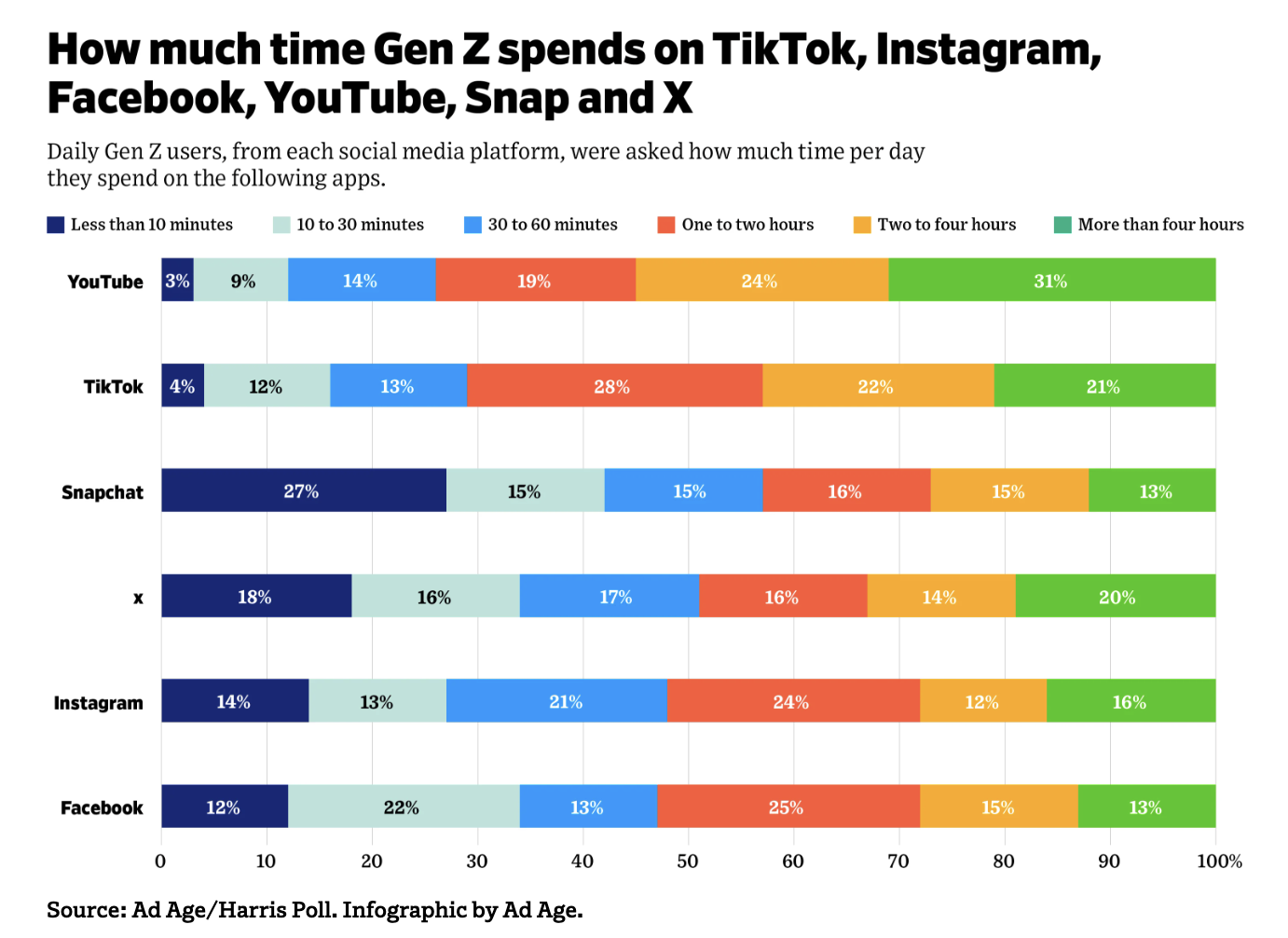
VIRTUAL REALITY INTEREST CLIMBS
Virtual reality technology is steadily becoming less virtual and more accurate, according to our Harris Poll research in Ad Age.
- 18% use VR technology, and 33% have not tried it yet but are interested.
- 27% have not used it and are not interested in trying it.
- 65% of those who have used or would like to use VR headsets are motivated by gaming.
- 51% have used or want to use it to watch immersive content.
- 47% use VR to simulate travel or other real-world experiences.
- VR usage decreases with age: 38% of Gen Zers use the tech compared with 28% of Millennials, 15% of Gen X and 4% of Boomers.
- At the same time, older generations are most interested: 38% of Boomers and X are interested in trying VR, compared with 33% of Millennials and 16% of Gen Z.
CONSUMERS IN THE DRIVER’S SEAT OF ‘WHOLE HEALTH’
The wellness market in the U.S. is worth $480 billion and is expected to grow 5% to 10% annually. The future is about “whole health,” however, with consumers taking matters into their own hands more than ever before, according to Stagwell’s Assembly’s new Whole Health Navigation Guidebook.
- A 300% increase is seen in people looking to utilize GLP-1 drugs like Ozempic and Wegovy.
- 71% of Americans express interest in taking a microbiome test to get personalized diet recommendations.
- 71% of Gen Z and Millennials are turning to social media to self-diagnose conditions – particularly related to mental health – instead of going to a healthcare professional.
- 77% of Gen Z athletes that say they feel more connected to others when seeing their friend’s or family’s activities on Strava.
ICYMI
In case you missed it, check out some of the thought-leadership and happenings around Stagwell making news:
- Gen Z and Millennials say streaming costs them too much
- Should Distracted Driving Laws Apply to Your Dog?
- Gen-Z, Millennial Workers Say On-Demand Pay Would Help Them Pay Bills On Time
- It’s Time To Fuse AI And Blockchain: 5 Ways To Do It
Related
Articles
In the News, Investments & Financials, Press Releases, Talent & Awards
Jul 08, 2025
Stagwell (STGW) Advances Executive Team with Four Key Appointments

In the News, Press Releases, Thought Leadership
Jun 10, 2025
Stagwell (STGW) Chairman and CEO Mark Penn to Discuss the Irreplaceable Power of Human Creativity on the Main Stage of Cannes Lions

Events, In the News, Press Releases, Talent & Awards
Jun 05, 2025
Code and Theory Named ANA B2B Agency of the Year After Transforming the World’s Leading Brands

Newsletter
Sign Up
By: Ray Day
CONTACT:
We wanted to share our latest consumer and business insights, based on research from Stagwell. Among the highlights of our weekly consumer sentiment tracking:
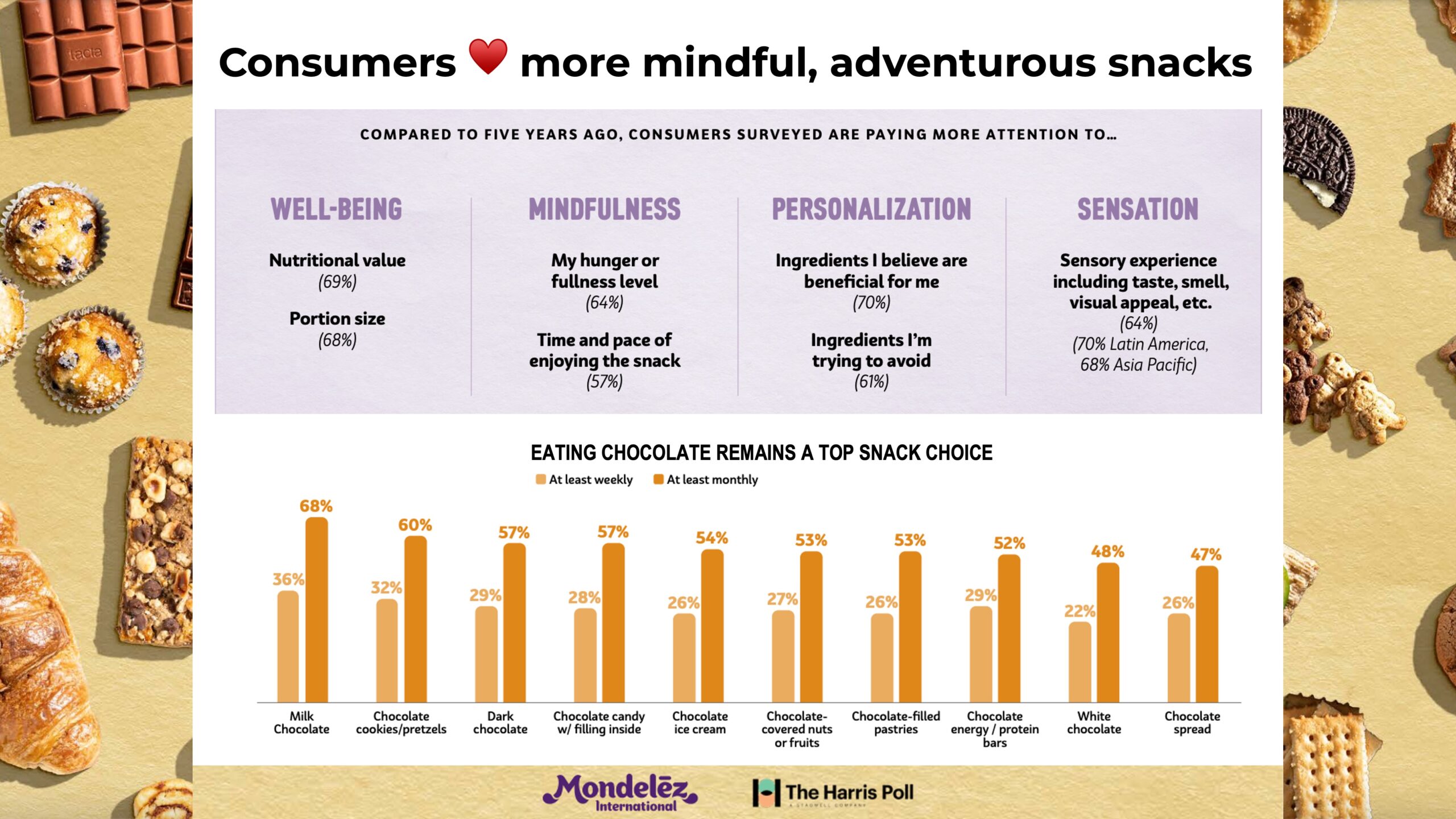
AMERICANS SLIGHTLY MORE OPTIMISTIC
Americans are feeling a bit better about the country – yet not their personal financial situation, according to our most recent poll with the Center for American Political Studies at Harvard University.
- 34% of Americans say the country is on the right track (up from 32% a month ago), and 34% say the economy is on the right track (the same as a month ago).
- 47% say their personal financial situation is becoming worse (compared with 45% a month ago). This view is highest among Republicans (65%) and Independents (49%) versus Democrats (28%).
- 36% say immigration is the most important issue facing the country, followed by inflation and price increases (33%).
- From a personal standpoint, inflation remains the top issue (38%, down 3 points from last month).
- When asked about a ban on TikTok, 64% believe the risks to Americans’ personal and national security outweigh the benefits of using TikTok. This view is highest among those ages 65 and older (85%).
- 65% support the bill that would ban TikTok in the U.S. if ByteDance does not sell it to a U.S. government-approved buyer.
SNACKING, THE GREAT STRESS RELIEVER
The world loves to snack, and it’s become the way consumers take their minds off the issues of the day, according to the fifth annual global State of Snacking report from The Harris Poll and Mondelēz.
- 88% of global consumers snack daily – and 60% enjoy snacks twice daily.
- The numbers are even higher among younger consumers: 94% of Gen Z and Millennials snack once or more a day; 68% snack at least two times a day; and 33% have three or more snacks a day.
- 6 in 10 consumers prefer snacks over traditional meals – favoring small, more frequent meals throughout the day.
- 67% are looking for snacks that are portion-controlled – 5 points higher than last year’s study.
- 54% are eating more plant-based snacks – 4 points higher than last year.
- A global favorite: chocolate. 65% of consumers in North America would rather give up social media for a month than chocolate (57% globally).
- 84% of consumers in North America have been loyal to specific snacks or brands for a long time (compared with 76% globally).
- 68% seek out snacks that evoke memories of their childhood or past experiences.
1 IN 4 AVOID COLLEAGUES WHOSE NAME THEY CANNOT PRONOUNCE
Mispronouncing a work colleague’s name – particularly a person of color – is a regular occurrence and a source of office stress, based on our Harris Poll research with Fast Company.
- 36% of people of color say their names are mispronounced most or all the time (compared with 18% of white counterparts).
- 33% of professionals of color report experiencing discrimination at work because of their name (versus 16% for white workers).
- 35% of Americans become anxious when they see a name they cannot pronounce, and 23% avoid someone whose name they cannot pronounce.
- Conforming rather than informing: 56% of people of color say they have changed their name at work in some way, and 13% have been told to change their name to make it easier to find a job.
SUMMER VACATION = MORE DRIVING
Spring has sprung, and America is thinking about summer vacations – with more planning to travel by car to save money, based on our Harris Poll survey with NerdWallet.
- 45% of Americans are planning a summer trip requiring airfare or a hotel stay.
- We will spend an average of $3,594 on vacations this year.
- 91% are taking action to save money on travel expenses – with 42% driving instead of flying to their destination (compared with 35% driving last year).
- 20% will go into debt for vacations this year.
- 22% will skip a vacation this summer because travel has become too expensive.
- 43% say recent air travel incidents have made them more wary to fly.
STREAM AND CANCEL
Consumers today are confused by all the streaming options, and they’re ready to watch and cancel at a moment’s notice, according to our Harris Poll survey with Ad Age.
- More than half of viewers subscribe to a streaming service for an individual show and then cancel after watching. The trend is higher among younger people: 63% of Gen Z and 62% of Millennials say they’ve streamed and canceled.
- Netflix continues to dominate the streaming market: 66% are interested in Netflix’s original content among a list of competitors – jumping to 83% among Gen Z and 74% among Millennials.
- Prime Video ranks second with 55% interest overall.
- Gen Z’s second preferred streamer for original content is Disney+ with 60% of respondents selecting it.
- Second among Millennials is Hulu at 59%.
ICYMI
In case you missed it, check out some of the thought-leadership and happenings around Stagwell making news:
- RiskRep Radar: The Politicization of Return to Office
- What the rise of generative AI means for America’s creative class
- Execs plan to invest more in AI this year but implementation barriers remain
- Most HR pros say companies are likely to expand, not reduce, fertility benefits
- Only 22% think they know the middle names of at least half of their friends or acquaintances
- Nearly Three-Quarters of Americans Mistakenly Assume Clear Pool Water Is Clean, Swim-Safe Water
Related
Articles
In the News, Investments & Financials, Press Releases, Talent & Awards
Jul 08, 2025
Stagwell (STGW) Advances Executive Team with Four Key Appointments

In the News, Press Releases, Thought Leadership
Jun 10, 2025
Stagwell (STGW) Chairman and CEO Mark Penn to Discuss the Irreplaceable Power of Human Creativity on the Main Stage of Cannes Lions

Events, In the News, Press Releases, Talent & Awards
Jun 05, 2025
Code and Theory Named ANA B2B Agency of the Year After Transforming the World’s Leading Brands

Newsletter
Sign Up
By
Stagwell’s Risk and Reputation Unit
Welcome to the RiskRep Radar, an every-other-week newsletter from Stagwell’s Risk and Reputation Unit on what companies and business leaders need to know about the intersection of business and politics.

During COVID, businesses innovated and listened in warp speed. Leaders today need to do so again to create the next chapter of employee engagement and communications, while addressing diverging demographics and values about the future of work.
A Difference in Values and Diverging Demographics Are Causing WFH Culture War
Four years into the work-from-home experiment, the culture war is in full swing. Where you work has become a partisan issue.
Democrats are more likely than Republicans to say remote work is good for employee wellbeing (+13 percentage points), company bottom lines (+15 percentage points) and career advancement (+16 percentage points).
Republicans are more likely to say that it’s frustrating to hear complaints about in-person work when so many frontline workers do it daily (+9 percentage points); and that work has traditionally been “in-person” and that’s how it should be (+10 percentage points).
WFH is also a battle of generations. Millennials, along with Gen Z, are leading the WFH narrative and believe they have leverage over employers. In fact, 71% of Millennials believe they could readily seek out a job with higher pay. At the same time, Gen Z has a steep learning curve that WFH is not helping: 82% of managers say new Gen Z hires’ soft skills need more development.
What the Future of Work Looks Like Now That Everything’s Politicized
Americans increasingly care more about quality of life than simply climbing the corporate ladder. Employees’ top 2 priorities are to “build financial stability so I can pursue what I care more about” (37%) and to “establish a better work life balance” (35%).
Younger workers also believe businesses have broken promises made to them during COVID. That includes 67% of Millennials and 54% of workers overall who say they were promised better work-life balance that never happened. And it’s not just young people who prioritize “work to live” versus “live to work.” Of all American workers, 78% say they would be more loyal to a company that gave employees the freedom to choose where they work from.
What Business Leaders Should Do
To start, business leaders need to modernize employee communications and engagement. In most companies, more than 70% of employees want clearer views of company strategy. Half of employees want more focus on operational changes and organizational goals rather than macro news and generic business updates. In short, employees want more context.
In addition:
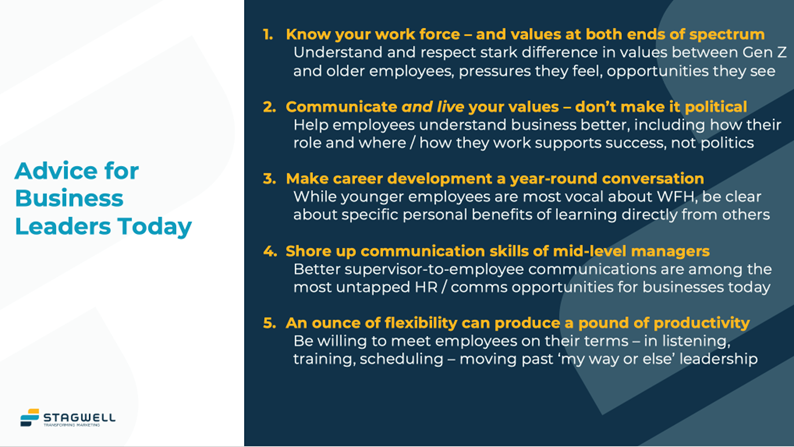
Explore the full presentation on the politicization of return to office here.
Mark Your Calendar: April Webinar on Cybersecurity
Our next 30-minute, free risk-and-reputation webinar is at noon ET Thursday, April 18. Together with Stagwell’s communications firm Allison, we will focus on how business leaders can build and protect reputations in the era of cyberwarfare and misinformation. To RSVP, email Alexis Williams.
ICYMI: Risk and Reputation Unit in the News
Related
Articles
In the News, Press Releases
Jul 09, 2025
STAGWELL LAUNCHES STAGWELL MEDIA PLATFORM (SMP), A CENTRALIZED TEAM OF GLOBAL MEDIA, TECHNOLOGY AND DATA INVESTMENT EXPERTS

Artificial Intelligence, In the News, Marketing Frontiers, Press Releases, Stagwell Marketing Cloud, Tech
Jun 12, 2025
PRophet, a Stagwell (STGW) Company, Completes Integration of UNICEPTA, Launches Unified Brand and Enhanced Media Intelligence Offering

In the News, Marketing Frontiers, Press Releases, Stagwell Marketing Cloud, Tech
Jun 11, 2025
The Marketing Cloud Launches Cutting-Edge Platform to Simplify Marketing Workflows


